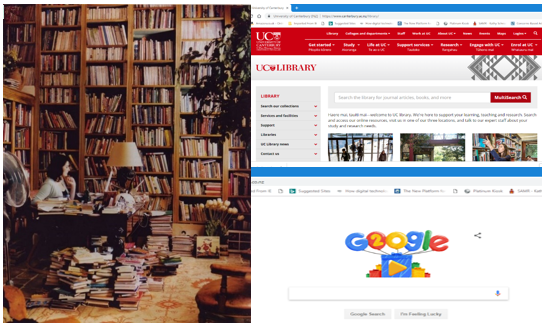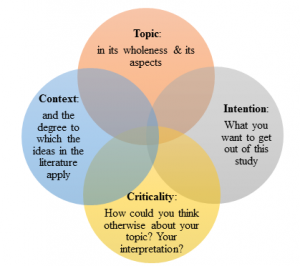
In my experience reading through the existing documents and reviewing relevant literature is a challenging job in the research process. The process of reviewing literature continues from the beginning of thinking about research to finalising a research paper or thesis. I believe that a researcher begins a research right from the beginning to think about what the research problem is and explores relevant information to the research problem. A researcher uses own bank of knowledge and various documents as a reference to define the research problem. However, it is not an easy job for anyone to explore resources and to find relevant information in the resources. Here, the researcher needs to have skills in reading documents and reviewing the literature and most importantly select the right resources from a vast ocean of resources such as the physical library, digital library and websites.

Let me share my experience of exploring resources, finding right documents, reading through lines and picking relevant information from the documents. When I started my second Masters in Education at the University of Bedfordshire in England in 2009, I struggled a lot to understand and learn the way of searching documents in both physical and digital libraries and had to wriggle when I was unable to recognise right information in the available resources. I cannot remember how often the library liaisons and tutors helped me explore digital books, journals and website information. It took a while to recognise the right information in journals, book chapters, newspapers and websites. I believe the way I learnt to read documents and review information relevant to research problems, questions or purposes is a generic skill needed for researchers to review literature. As you read a document, remember what to review.
In the beginning days of my Master’s research, I used to randomly pick information from documents, but gradually my tutors’ support and guidance, and the seminars I attended helped me to improve my way of reading skills and develop skills of reviewing literature. As a result, I was able to review the literature for my research more comfortably and systematically. Moreover, I was able to reflect the skills in my doctoral research activities from the beginning of developing a research proposal to the end of finalising thesis at the University of Canterbury, New Zealand. The following diagram provides a guideline:

The above diagram (Presented by Professor Janinka Greenwood in the Creativity & Change Lab at the University of Canterbury) provides a fundamental guideline for reading documents and reviewing literature. The circles are interconnected in a literature and having the diagram on their mind can help a researcher to explore the right information in the documents and review literature systematically. The Topic in the diagram refers to the research topic. As a researcher or writer one needs to have a clear topic or the area to explore the right documents and the information within the documents. Moreover, the key aspects in the documents need to be relevant to the researcher’s own research area to relate the literature of the document. On the other hand, the Context in the diagram refers to the context of the research that the researcher has focused. When reviewing literature from journal articles, book chapters or other resources, a researcher needs to locate the context of the research information in the documents and provide the context in own review of the literature. The information becomes meaningful only in the contexts, the researcher must consider the context as an important aspect of the literature review process. The next important aspect of the literature review process is the Intention of the researcher which helps to read a wide range of texts in a document and explore the right content s/he wants to draw from the document. Another important aspect is the Criticality. The researcher needs to analyse how the information of the document relates to the topic and interpret it. It is a very important aspect in the process of reviewing information and interpreting in the body of literature because there is always a chance of biases. The researcher needs to reduce prejudices in the reviewed information.
When I started my doctoral research in education at the university, I got a good platform to learn reading skills and the skills of reviewing literature. Regular seminars in our research lab provided me with more opportunities for learning the strict discipline of reviewing literature such as exploring archived documents in a digital repository and printed materials, selecting right documents, scanning and skimming information in the documents. A researcher can use keywords and phrases to explore relevant materials available online from google, google scholar, EBSCOhost, digital library, etc. Similarly, the key terms and ideas of research can be helpful to select relevant books, journals and previous theses in the physical library. Moreover, the key ideas (specific topics) of the research can lead to reading through journal articles, specific chapters of bulky books and other documents. When reviewing literature, the researcher needs to have specific ideas to pick information from the resources such as journal article, book chapter, newspaper or other web pages and to interpret the information without any prejudices. The above diagram gives an idea to follow reading documents and what information to be reviewed from the resources. While reviewing any literature or a journal article, the researcher needs to bear in mind: who the researcher is, when the research was published, what the research is about (topic/ area), where the research took place (context), how the research was conducted (methodology) and what the results are. I believe that these key ideas help the researcher explore relevant information from documents, note key information when reading, interpret the information systematically and save valuable time.
Ideas shared are appreciable. They could provide innovative techniques to the novice researchers and academic writers like us. Thank you a lot, Karna sir.
The process of reviewing literature continues from the beginning of thinking about research to finalising a research paper or thesis. ….life long process ….never ends till there is research.
Great effort by our respected Guru
fruitful articles for academic writing.
I have gone thoroughly. It’s supportive for the novice readers like me. Thank you sir sharing this.